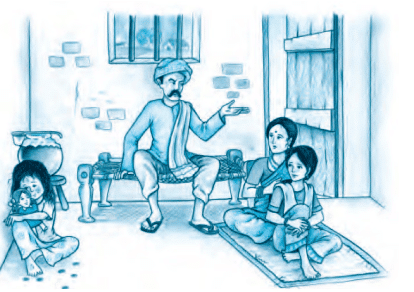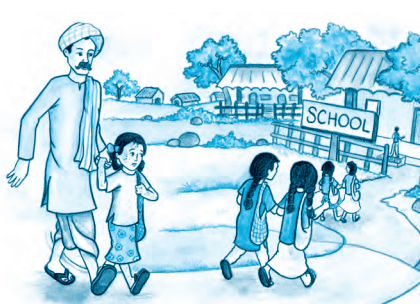Character Sketch: Bholi | English Class 10 PDF Download
| Table of contents |

|
| Character Sketch of Bholi |

|
| Character Sketch of Ramlal |

|
| Character Sketch of The Teacher |

|
| Character Sketch of The Tehsildar |

|
Character Sketch of Bholi
Bholi, whose real name is Sulekha, is a girl who faces multiple challenges in her life yet proves to be a symbol of courage and transformation. As the youngest of seven children in the family, she was initially perceived as a simpleton due to her physical and cognitive limitations. A fall during her infancy caused a head injury, which impaired her brain development, leaving her unable to speak until the age of five. When she finally began speaking, she stammered, making her an easy target for mockery and teasing by other children. This bullying made her withdrawn and reluctant to speak.
Bholi’s appearance further contributed to her isolation. At the age of two, she contracted smallpox, which left deep scars on her face. This, combined with her speech impediment, made her self-conscious. Her father, Ramlal, was concerned about her marriage prospects due to her appearance and her perceived lack of intelligence. However, Bholi’s character undergoes a significant transformation when she gains education at the local school. The encouragement and support of her teacher help Bholi develop confidence in herself, and she later rejects an unfair marriage proposal, asserting her newfound self-worth.
Through her character, Bholi embodies the theme of self-realization, empowerment, and defiance against societal norms. She proves that one’s worth is not determined by appearance or societal expectations, but by inner strength and character.
Keywords for Character Sketch of Bholi:
Courageous, Determined, Simpleton, Mocked, Bullied, Smallpox scars, Self-conscious, Marriage prospects, Educated, Empowered, Confident, Assertive, Independent, Transformation.

Character Sketch of Ramlal
Ramlal, Bholi’s father, is a prosperous farmer and a traditional, well-meaning man who is concerned about the welfare of his family. He has seven children, and although the family is financially secure, Ramlal's deep concern about Bholi’s future stems from her appearance and speech impediment. His attitude towards Bholi reflects the societal prejudices and traditional beliefs of his time, particularly regarding a daughter’s marriage prospects. Ramlal is depicted as someone who follows societal norms but is also swayed by the authority of others. His decision to send Bholi to school was influenced by the Tehsildar's advice, although initially, he did not see the value in educating her. Like many other parents of the time, he worried about Bholi's future marriage and saw education as secondary. Despite this, Ramlal is also shown to be a caring father, though his concern for Bholi’s marriage overshadowed his understanding of her emotional and intellectual growth. In the end, Ramlal’s actions reflect the conflict between tradition and modernity, as he comes to realize the importance of empowering his daughter rather than merely focusing on her marriage prospects. His character is a blend of concern, tradition, and gradual acceptance of change.
Keywords for Character Sketch of Ramlal:
Traditional, Conservative, Practical, Concerned father, Influenced by society, Marriage-focused, Conflicted, Responsible.

Character Sketch of The Teacher
The teacher plays a pivotal role in Bholi’s transformation. Unlike the others who pity or mock Bholi, the teacher sees potential in her and treats her with kindness and encouragement. The teacher fosters Bholi’s interest in education and helps her overcome her speech impediment by giving her time, attention, and a sense of security in the school environment. The teacher's patience and positive reinforcement make a profound impact on Bholi, as she begins to speak clearly and develop confidence in herself. The teacher also plays a key role in influencing Ramlal's decision to send Bholi to school. By advising Ramlal that sending his daughters to school would set a good example for the villagers, the teacher not only promotes education but also challenges traditional gender roles in a conservative society. The teacher’s character in the story highlights the importance of education in transforming lives, especially the lives of girls, who were often neglected in traditional settings. The teacher’s role as an empathetic guide and mentor becomes crucial in helping Bholi recognize her self-worth and find the courage to make important decisions for herself.
Keywords for Character Sketch of The Teacher:
Encouraging, Supportive, Patient, Inspirational, Mentor, Guide, Transformational, Compassionate, Motivating, Believer in education.
Character Sketch of The Tehsildar
The Tehsildar plays a small yet significant role in the story Bholi. As a government official, he visits Bholi’s village for the inauguration of a girls’ primary school and uses his influence to encourage villagers to send their daughters to school. He is an authoritative and influential figure, whose words hold weight in the village. He specifically advises Ramlal, the village Numberdar, to set an example by enrolling his daughters in school. His suggestion leads to Bholi being sent to school, an unexpected but life-changing decision for her.
The Tehsildar is also a progressive thinker and a strong supporter of education. He understands the importance of female education in transforming society. Overall, the Tehsildar represents progress and reform, advocating for education as a tool for empowerment. His character highlights the role of government officials in bringing social change and emphasizes the need to uplift girls through education.
Keywords for Character Sketch of The Tehsildar:
Authoritative, Influential, Progressive, Supportive, Catalyst for Change, Advocate for Education, Government Official, Reformist.
|
61 videos|617 docs|69 tests
|
FAQs on Character Sketch: Bholi - English Class 10
| 1. What is the main theme of the story "Bholi"? |  |
| 2. How does Bholi's character develop throughout the story? |  |
| 3. What role does education play in Bholi's life? |  |
| 4. How does Bholi challenge societal norms in the story? |  |
| 5. What message does the author convey through Bholi's story? |  |
















